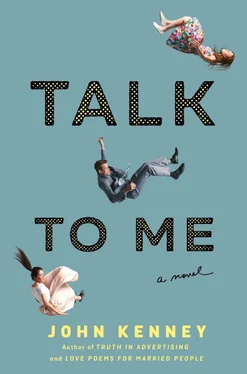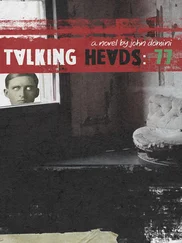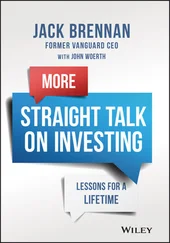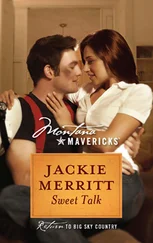“You’re Harold, Dad.”
Ted’s middle name. Franny loved that. Imagining Ted as a small boy. “We would be best friends,” Franny would say. “I would take care of you.”
Ted looked at Franny and then looked—if you go back you can see it on the tape online, it’s there—Ted looked off camera. He looked off camera and stared at a space. The producer wondered what he was looking at and even Anderson looked for a moment, listening to Franny answer.
Couldn’t they see what Ted was seeing? he wondered. It was so clear. Ted and Franny, lying in the bed, Ted still in his suit, tie loosened, sleeves rolled up, his big clean-smelling head, his bay rum aftershave, the lingering scent of it after a long day, still there. A scent Franny would forever find comfort in, a deep sense memory. Her father’s smell. Her father’s voice. She was safe.
What if the entire universe is in your children? What if every answer you’ve ever been looking for is in your children?
Ted looked at Franny. He’d not seen her, really seen her, in so long. He’d seen his own failing, his own fear, his own anger, his own wish for what he’d wanted her to be. He hadn’t stopped to see her, this separate being. But he did now. And he saw the world. The universe. The history of time and space and whatever might or might not be out there. She was it. He had been born to be her father. God bless Walt and his brief, brief life. But she was here now and he was here now and someday he would be dead and she would have children of her own and they might ask, What was your father like?
What would she say?
• • •
“Did you lie?” Anderson Cooper asked Frances Ford Grayson.
Franny’s hands were shaking but she had to say it. She had to tell the truth. But she never got the chance.
It’s so easy, Ted thought. It was a gift. He was being given a gift.
“No, she didn’t,” Ted said, voice strong. “I did.”
Ted’s eyes were locked on Anderson’s. He knew how to do this. He knew how to tell the truth. And it was the truth. The emotional truth. The larger truth. He was there but in body only.
He could feel Franny staring at him. Felt the crew staring at him. But he was used to this. He was comfortable in this. A life being watched. People waiting for him to speak.
“I’m sorry, Ted. What are you saying?” It was Cooper.
“What she wrote was true. I’m not sure this young woman… the woman who tweeted… who’s been saying she saw me there when my daughter was… ill…”
Cooper steps in. “I believe what this woman… Lauren Loeb is her name… what she claimed is that Frances overdosed and that you were there.”
Ted nodded, the story coming to him so naturally, as if it happened.
“My daughter was ill at the time. There was a winter storm and she was in the infirmary. My wife called me in London, while I was waiting for a flight to Kosovo. I chose that over… over my daughter, when she needed me. I’m not proud of it. My wife… Claire… is… an… exceptionally kind woman… a wonderful mother. I’m sure she told Franny I was on the way. What child wouldn’t want to hear that?”
“Why would Ms. Loeb lie?”
“I can’t answer that. I do know people like attention, like to try to take people down. I think what my daughter did in that piece took courage. I’m not proud of the kind of father I was. I’m not proud of the kind of husband I was. And it is exceptionally difficult to have that revealed to the world. It’s a level of shame that is… that has left me ruined professionally and personally. I say that not for pity. But I would ask for privacy. I’m no longer a public person. Nor is my daughter.”
Cooper. “Why didn’t you come forward sooner?”
“The honest answer? Because I was weak. I was embarrassed. Because I wanted my job back. You know what it’s like to live in the bubble. The money, the entrée into worlds others don’t get to see. You could pick up the phone now and get an interview with most any major politician, CEO, movie star, athlete in the world. Couldn’t you?”
“Well, I’m not sure…”
“Of course you could. Because you have that microphone. Because people respect you. Because you are good at what you do. Because you are trustworthy. I was, too. And I didn’t want that to go away.”
There is a moment, maybe two, when Cooper seems touched by the whole thing, a bit thrown from his game. He pauses. He looks like he wants to push, ask more. But instead he says, “What have the last few weeks been like for you?”
“I wouldn’t recommend it,” Ted said, looking at Franny, who forced a grin.
“Ted Grayson. Frances Ford. Thank you for being here tonight. Perhaps we do owe you privacy. Our conversation continues with the CEO of scheisse media, Henke Tessmer, when we come back. This is 360 .”
• • •
This was where Claire dropped her fork.
She was at Dodge’s, along with another couple, preparing dinner, and the TV was on. She was holding a serving fork and she watched her soon-to-be-ex-husband and her daughter on the television in Dodge’s kitchen and the emptiness that she felt was frightening. The feeling of standing at the check-in counter to fly home to see a sick child only to find the flight has been canceled. A fear and panic. She knew only that she had to get to them. She dropped the fork when Ted spoke, when he told the story. It wasn’t true. But she believed it. She wanted to believe it. She picked up the fork and looked at Dodge. “I have to be with my family.”
She walked out of the kitchen, grabbed her coat by the door, and left.
• • •
Henke walked to the set, accompanied by a PA. Ted saw him as he passed through the corridor. And maybe he would have kept going. Maybe he would have simply walked on. But Franny froze, just for a second. She stopped walking. An abrupt thing. A thing she used to do when she was scared. Ted looked over and saw it on her face. She looked at Henke and then looked away. Things seemed to move slowly for Ted. He heard his heart beat in his eardrums, this loud beating, as he took in Franny’s face, her fear, the change, and the bravery as she starting walking again, as she stared directly at Henke. This tough kid. Tough woman. Who she’d become, through no help from him. But then he turned to see Henke smiling. Not a friendly smile. Taunting.
Why are we here? What’s the point? After we are stripped bare, naked before the world, after everything is taken away, all we have is our children. And we have two basic, fundamental jobs as parents. To love them. And to protect them.
Ted gently pushed Franny back, making space. And Henke stopped. He would think about this moment for a long time after, about stopping and saying what he said. If he had just kept his mouth shut. But he didn’t. He leaned forward and whispered to Ted. “She didn’t want to run it. The story about you. She asked me not to. I did it, anyway. I ordered the photo of her getting out of the cab, too.”
He smiled, his bulbous, Teutonic head jutting forward. No self-respecting kid from the streets of Woonsocket would ever be dumb enough to do that. There was the briefest hesitation from Ted. A small shock, really, that a person could be this way. Henke seemed to be the embodiment of everything ugly about social media. Shocking and angry and ugly and mean. I’m sorry for all of us, Tamara had said.
By the same token, fuck him.
The shock faded fast, replaced in full force by anger, by the moment, by his own absence and apathy as a parent, by his own sins as a father and husband. Ted found a quickness and strength he’d not known in years. A muscle memory from his tougher days, in the gym, punching a big bag. He reared back now and hit Henke as hard as he could in the face, smashing his nose. Henke’s head snapping back, the sound a comical Hollywood Foley, a fist hitting a head of iceberg lettuce. Except it wasn’t lettuce. It was a smug, spoiled German wearing surfer clothes. Henke’s legs buckled, a Wile E. Coyote moment, except this was an actual man and he seemed to hang for a moment before dropping to the floor like a string of bratwurst dropped from a great height. He moaned loudly. Remarkably, no one had an iPhone trained on the incident and it went unrecorded. The punch, that is. The evidence of the felony. The moments after, however, were, indeed, recorded.
Читать дальше












